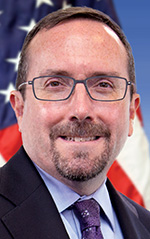Mental Health Support at State: No Shame, No Penalties
An FSJ Q&A with Under Secretary for Management John Bass

Beth Walrond
Foreign Service Journal: In your role as Under Secretary for Management, you oversee both the Bureau of Medical Services (MED) and the Bureau of Diplomatic Security (DS). These are the two bureaus with the most influence on whether people seek mental health care and the impact of that care on their careers. From that position, how do you ensure the most access for those who need it?
U/S John Bass: Ensuring our workforce and family members have access to quality mental health services is more important than ever, and I take that responsibility very seriously. A career with the State Department involves normalizing activities that are quite stressful—starting with regularly changing where one lives, works, or goes to school.
This career often entails times of great difficulty, distance from family, even acute crisis. I’ve spoken quite openly about my own challenges dealing with stress and trauma, and how indispensable MED’s mental health services were and are to me. Awareness of the available services is, of course, important; but the readiness to take advantage of those services is the crucial final step. The State Department’s Employee Consultation Services (ECS) is a great place to start, and they are available 24/7 at (202) 634-4874 or via email to MEDECS@state.gov.
It’s also important to note that the Bureau of Diplomatic Security (DS) does not play a role in deciding whether or not a person needs, or receives, care. DS does have an important role, though, in ensuring that individuals experiencing difficulties in their personal or professional lives do not unwittingly put the department, their co-workers, and national security at risk. The Office of Insider Threat Program (ITP) supports the Department of State community by providing a platform to report concerning behaviors employees witness in the workplace. ITP is focused on supporting the workforce by engaging with partners across the organization to find effective resolutions to problematic behavior. Individuals can raise these concerns anonymously on the intranet page or by emailing InsiderThreatReporting@state.gov.
FSJ: What services does the State Department provide to support employee and family member mental health? Can you tell us how access to mental health care services works overseas? Who has access to these services at posts? Are the services available to all employees of all agencies at post and their family members? Do locally employed staff also have access to these services?
JB: Let’s start by recognizing that asking for help can be hard. I’ve experienced this hesitation myself and shared my experiences of asking for and receiving help during some trying times. I strongly encourage our department family to explore and utilize the mental health care services provided by MED (or by private providers if that is your preference). MED has an expert team of psychiatrists and social workers who are available to anyone under chief of mission authority. Our MED colleagues are there to support us and do so with compassion and understanding.
We also have adjusted to ensure that locally employed staff are provided access to the department’s Employee Consultation Services at times of crisis or during acute events. This can include one-on-one counseling or virtual support groups.
FSJ: Many FS members express concern that they will lose their security clearance if they seek mental health services. We understand that the security clearance renewal process can be held up for this, which disincentivizes getting help when most necessary. Are these valid concerns? How often does this happen? Can you provide any data on the impact of seeking mental health care on security clearances?
JB: Not only is there no shame in asking for help, there is no penalty in the department either. I want to emphasize that getting treatment is a sign of strength, not weakness. Seeking and receiving treatment actually is viewed favorably in the security clearance adjudication process. Undergoing mental health counseling in and of itself is not, and will not be, a reason for a negative security determination—full stop.
Like other departments and agencies, State adheres to the National Security Adjudicative Guidelines in determining whether individuals should have access to classified information. These guidelines acknowledge that certain psychological conditions that affect behavior may negatively impact an employee’s ability to protect national security information. If information gathered during an employee’s background investigation indicates that there may be an emotional, mental, or personality condition that could cause a significant security concern—including or emphasized by alcohol and/or substance abuse—DS consults with MED.
MED assists the DS adjudicative team by offering a professional medical opinion as to whether the individual has a condition that may impair judgment, stability, reliability, or trustworthiness, particularly in the context of their ability to follow rules and properly safeguard classified or national security information, or to perform sensitive duties.
FSJ: As part of the security clearance and renewal processes, does DS have to ask whether someone has sought mental health care, and is DS required to act on “yes” responses?
JB: Yes, to some degree. The questionnaire for national security positions (Standard Form 86) is used across the federal government and does include questions relevant to psychological conditions. These questions are focused on psychotic disorder, schizophrenia, schizoaffective disorder, delusional disorder, bipolar mood disorder, borderline personality disorder, or antisocial personality disorder, and others that could have a substantial adverse impact on judgment, reliability, or trustworthiness, particularly if left untreated.
Undergoing mental health counseling in and of itself is not, and will not be, a reason for a negative security determination—full stop.
FSJ: Can you or anyone else in leadership say unequivocally that seeking mental health care in and of itself will not have a negative impact on a security clearance?
JB: I want to be clear: seeking mental health care, in and of itself, will not have a negative impact on a security clearance. It’s important to emphasize that unchecked actions or behavior, even those stemming from a mental health condition, are the primary concern from a national security standpoint. Even employees with diagnosed serious psychiatric conditions may hold a security clearance if there is evidence that treatment, including medication, effectively addresses the condition such that the employee’s judgment, stability, reliability, or trustworthiness are not impaired, and the individual has demonstrated ongoing and consistent compliance with the treatment plan.
FSJ: What is the State Department doing to ensure seeking mental health support is not stigmatized? Does this require a cultural shift, and is that happening?
JB: Like many aspects of how we operate around the world, our approach to mental health care is evolving. We’ve come a long way, but we still have some work to do. Asking for help is especially difficult in an organization of “can-do” people whose careers are centered on finding solutions to global problems and serving others.
My overseas assignments have often been to countries that have suffered from conflict and terrorism. I’ve had a few close calls. I also felt deep grief when my first wife and fellow FSO died after living with cancer for many years. I’ve wrestled with fear, with doubt, and with survivor’s guilt. And several times, I reached out and asked for help from mental health professionals.
Early in my career, I had to look outside the State Department, and I didn’t talk about it with colleagues. But over the past 15 years, I found support from the dedicated professionals in MED. The department’s mental health care professionals not only understand how traumatic experiences affect our mental and emotional health but also the particular challenges and stresses of a career serving our nation far from home.
When I look across the department and our overseas missions, I see the stigma long associated with mental health care services declining—not uniformly everywhere, but to a much greater degree than 10 or certainly 20 years ago. I think this reflects a larger cultural shift that’s underway in our society.
We’ve taken a number of steps to try to accelerate and reinforce this cultural shift within the department, including to benefit colleagues from other foreign affairs agencies. For MED, that means prioritizing personal well-being without fear of repercussion, and reforming its clearance protocols to emphasize education, counseling, and collaboration. MED is also strengthening its collaboration with DS to promote a culture of openness and support. Through joint educational initiatives, both bureaus are working to dispel the notion that seeking medical or mental health assistance will affect the security clearance process.
Over the last two years, DS has ramped up messaging on this issue, encouraging potential applicants (and the workforce as a whole) to seek treatment and look out for their mental health without fear of security clearance implications.
I see the stigma long associated with mental health care services declining—not uniformly everywhere, but to a much greater degree than 10 or certainly 20 years ago.
FSJ: Today, with what many see as a crisis in adolescent mental health, we hear frustration from members trying to get adequate mental health care for FS kids overseas. What is the department doing to help families access the mental health services their kids need?
JB: We are acutely aware of the need and have prioritized securing additional funding, even in a tight fiscal environment, to provide additional services. MED is working hard to be responsive. Our regional psychiatrists provide equal time and services to children and adolescents as they do for adults, but the needs exceed the capacity of those regional personnel. MED is working hard to assess and review local resources, as available, and build a robust database of virtual services that can supplement department services.
Of course, there are some parts of the world where specialty resources are simply not available on the local economy and/or difficult to access virtually. In those circumstances, we strongly encourage parents to reach back to MED to discuss their challenges and explore options together.
FSJ: How is the department dealing with the increased demand for mental health services accompanied by a shortage of providers? Is State adding mental health provider positions to the 21 psychiatrists who serve overseas posts? Is the pilot program to bring on providers in addition to psychiatrists (licensed clinical social workers, for example) happening? Can you update us on those plans?
JB: We are continuously exploring innovative solutions to meet the growing demand for mental health support overseas. We’re actively engaging in preventive projects to better prepare and equip individuals before their assignments, ensuring they’re both well informed about available resources and mentally equipped for their postings. For instance, we’re providing insights to future ambassadors and deputy chiefs of mission to help them understand the stress experienced by their staff and its long-term effects so they can have the tools to support their mission.
The pilot project to deploy mental health practitioners to posts beyond a small collection of designated locations is underway. The inaugural position will be established in Doha this June. Although additional full-time equivalents haven’t yet been allocated for further expansion due to budget challenges, posts will soon have the flexibility to fund mental health practitioners’ positions and coordinate with MED for candidate selection.
FSJ: What will budget cuts mean for mental health resources? Will the State Department have to cut back on its planned hiring of additional mental health professionals?
JB: We are still evaluating the impact of this year’s budget cuts, but I anticipate it will take us longer than planned to further scale the program to the extent leadership had envisioned. MED is no stranger to working with such constraints, and we are going to continue working to ensure the department has sufficient resources to provide the excellent services our community expects—and deserves.
MED’s mental health team is actively curating a list of virtual therapy clinics and mental health professionals around the globe.
FSJ: The COVID-19 pandemic and accompanying rising demand for mental health services also led to expanded options for telehealth for mental health care. This would seem to be an especially helpful change for the Foreign Service. What has State done to make telehealth more accessible for FS members?
JB: I think there are ample opportunities for us to build on MED’s experience with telehealth. For more than a decade, MED has been providing video health services through Health Units, and many of our regional psychiatrists rely heavily on telehealth connections to regularly conduct private, high-impact sessions. There is every reason to expect that telehealth services will become more prevalent and common in the coming years, a fact that is reflected in MED’s modernized medical clearance process.
MED’s mental health team is actively curating a list of virtual therapy clinics and mental health professionals around the globe, and I encourage your readers serving overseas to explore those opportunities by connecting with their respective regional medical officer psychiatrist.
FSJ: As part of the FSJ focus on mental health care for the Foreign Service in the January-February 2016 edition, we reached out to FS members worldwide for their input on their own experiences with mental health care in the Foreign Service and asked for their recommendations.
My editor’s letter summarized what we heard: People want (1) a clearer understanding of what services are available and how those can affect clearances, both medical and security; (2) assurances of privacy; (3) confidence that they will not be penalized for seeking help; (4) a destigmatization of mental health care; and (5) relief from toxic bosses and unrealistic workloads.
That was eight years ago. Where are we today on these five asks?
JB: Some of this was touched on earlier in our discussion—we’ve come a long way but still have some work to do. We’ve made great progress in modernizing the clearance process for individuals going overseas, including for mental health conditions. MED and DS strive to destigmatize their procedures, enhance the available information, and expand support provided to the workforce, ensuring that mental health conditions do not hinder overseas clearances.
We need to continue seeking ways to sustainably expand services, especially for children, adolescents, and emergency cases. At the same time, our medical professionals personify agility and reliability in the care we currently provide to our overseas community.
Mental health care is integral to overall medical care, and MED operates with an interdisciplinary approach in our Health Units, which comprise physicians, nurse practitioners, physician assistants, registered nurses, psychiatrists, and laboratory technologists. Together, they remain steadfast in championing health care for our diplomatic community abroad.
FSJ: What’s your advice for colleagues who are struggling but afraid to get help?
JB: Taking that first step—asking for help—can be really difficult. Please try to realize that you’re not alone. I’ve been there myself, as have many, many of your colleagues. Please think about the support structure you have, and use, when you’re faced with a difficult situation or need to make a tough choice, and consider leaning on one or more of those people to help you take that first step.
Reaching out for support was one of the best decisions I ever made for myself. MED’s mental health team are understanding, nonjudgmental professionals. They listen. They can offer valuable guidance. They can help you navigate difficult times.
When sharing or linking to FSJ articles online, which we welcome and encourage, please be sure to cite the magazine (The Foreign Service Journal) and the month and year of publication. Please check the permissions page for further details.
Read More...
- “Encouraging Employees to Seek Help” by Anonymous, The Foreign Service Journal, January 2008
- “The Evolution of State’s Mental Health Services” by Samuel Thielman, The Foreign Service Journal, January-February 2016
- “The Face of Mental Health Services Overseas” by Stephen A. Young, The Foreign Service Journal, January-February 2016
- “Treating PTSD: Learning Firsthand How to Manage” by James Eusanio, The Foreign Service Journal, May 2019





